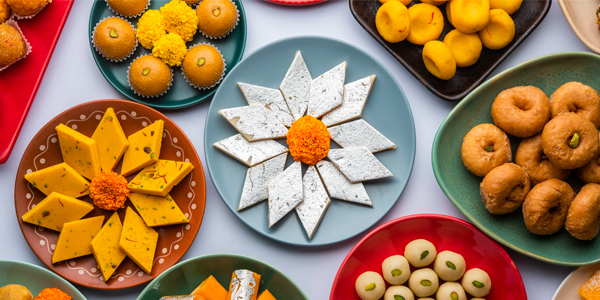Eat, drink, shop, rest and rejuvenate is all we want to do around festivals. And why not? It is the biggest festival of the year and we deserve some merry time for ourselves.
The moment we think about Diwali goodies, we imagine rich desserts, fried namkins, baked sweets and chocolates. Knowingly or unknowingly, we tend to push the ‘healthy eating resolutions’ away during festival times. Some of us start planning a post-Diwali detox, but are not ready to indulge a little less in the festive season.
In India, the festive season begins long before Diwali. They say that the month of Shraavan brings all festivals along with it in a trail: Hartalika Teej, Ganesh Utsav, Navratri/Dussehra, Karwa Chauth, Diwali and Chhath. This is indeed a long season of indulgence. Unless we resolve to eat mindfully, the indulgence can begin to take an unhealthy toll.
Enjoying yourself around the festive season does not mean having an unhealthy diet or giving up on practicing proper self-care.
[the_ad id=”6076″]
Here are some tips to follow while you indulge in the spirit of the season and yet remain mindful of health.
Eat Mindfully:
Remember to choose quality over quantity. Plateful of Diwali goodies can have more empty calories than you would have thought. The sweets tend to be fat-laden or deep fried and the namkeens have way too much of salt and oil than you intended to eat a day. While it can be tempting to eat a plateful, eating small portions for the taste helps avoid overindulge. Chew your food as it helps with satiety and aids digestion of carbs. Those who chew their food well tend to eat less, digest better and are better satiated than others.
Plan regular/traditional breakfast and lunch so as to avoid munching on Diwali namkeens as snack. If you make your own sweets and namkeens try air frying instead of deep frying some items. Some delicacies like ‘karanji,’ and ‘thekua’ can be baked too (check recipe here). In laddus, opt for the lentil flour ones over ‘motichoor’ ones, which have more fat and the process involves deep frying.
Choose mindfully; for example, if you have to choose between a gulab jamun and a rosogulla, opt for a rosogulla. Rosogulla does not involve frying, has less fat and excess sugar syrup can be squeezed out of it.
Share your sweets and desserts; this reduces the portions consumed, while the happiness doubles. At family get-togethers, use smaller plates and spoons for better portion control.
Use the rule of 3 before you go for a second serving.
Drinks and beverages:
Avoid colas/soft drinks at all costs, as all you get are empty calories. Now, with changing times, social drinking of alcohol around the festival season is the new norm in some areas, especially cities. While it is party time and may be your long-awaited hangout time with buddies and cousins, limiting alcohol intake is important.
Try and limit yourself to two alcoholic drinks. Replace the sugar in cocktails with natural fruit juices, sparkling water and club soda.
Hydration:
Remember to drink enough water and keep yourself hydrated. Especially with the cold weather around, this often gets neglected. A thirsty person tends to eat more out of dehydration.
Oil baths:
Enjoy the traditional Abhyanga Snaanam with scented oils and scented, herbal Ubatans. There is nothing more refreshing and relaxing. What’s more, there are numerous health and skin-care benefits attached.
Keep Moving, stretching and flexing:
The festive season around can make us forget our gym and exercise routine. Especially when this is your long-awaited holiday/vacation time, you may want to be a ‘couch potato’ for once. However, if you look closely Diwali offers plenty of opportunity for some movement.
Some deep cleaning before the actual day is nothing but your exercise substitute for the day. Try and tie that lantern high up and decorate the house. These are enjoyable ways of getting some exercise. Remember to stretch before performing some unusual tasks, and remember to relax your muscles once done.
Try making a rangoli in the morning every day and make a large one if you can. Large rangoli allows for some nice bending, flexing and sit-ups on the way. If you want to draw a small one, make sure it calls for some real meticulous efforts.
Enjoy some firecrackers with the children around. Help them enjoy a safe Diwali. They say that time spent with children is enriching in more ways than we understand. Visit family and friends; go the extra mile.
Offer prayers and Practice Gratitude:
Lastly, not to forget offering prayers together as a family is at the core of Diwali celebrations. Offer your prayers and practice gratitude. While a new Samvat year begins, be thankful to whatever the bygone year had offered and remain optimist for what the new Samvat year will have in store for you. Gratitude goes a long way for mental health.
In conclusion, Diwali is a time for rich food, family, friends and festivities; however, you need not give up on your health and wellness goals. All it takes is a bit of planning, some smart choices and mindfulness to remain healthy while still enjoying the festival with full fervour.
Keep these tips in mind to enjoy a happy, healthy Diwali, Chhath and New Year!
Image by: stockimagefactorycom on Freepik
Source:

Dr. Mamta Lele- Pawara
(MD Ayurveda-Internal Medicine, CRAV-Kayachikitsa, MA Sanskrit)
